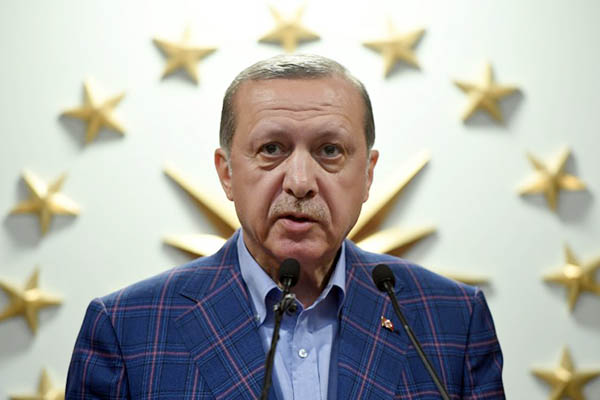
Bulent Kilic—AFP
Turkish president says he expects next month’s meeting between leaders to result in turnaround of troubled relationship
President Recep Tayyip Erdogan voiced confidence on Friday that he and Donald Trump can open a “new page” in troubled Turkey-U.S. ties when they meet next month, after discord over Syria and last year’s failed coup.
The May summit between Erdogan and Trump, their first face-to-face encounter as heads of state, is a chance to mend a relationship between two key NATO allies that was strained by a series of disputes under former president Barack Obama. “I believe that we will open a new page with Mr. Trump in Turkey-U.S. relations,” Erdogan told the Atlantic Council Istanbul summit ahead of the May 16 meeting in the United States.
Erdogan made clear he expected a turnaround from Trump on the use of the Syrian Kurdish Peoples’ Protection Units (YPG) as the chief U.S. ally on the ground in Syria in the battle against Islamic State jihadists. Turkey says the YPG is merely the Syrian branch of the outlawed Kurdistan Workers’ Party (PKK), which has waged an insurgency inside Turkey since 1984 that has claimed tens of thousands of lives.
“We expect our American friends to better understand the threats our country is facing and to show the solidarity that we need,” said Erdogan. He said that “concrete support” given to the YPG by the United States in Syria was “harming the spirit of alliance and partnership.”
His comments came after Turkey this week bombed YPG positions in Syria, prompting American accusations the strikes were not properly coordinated. There have also been three straight days of border clashes between the Turkish army and the YPG, the latest in the Ceylanpinar district of Turkey’s southern Sanliurfa province. Eleven “terrorists” were killed, the Turkish army said.
Erdogan warned the YPG that Turkey would “take this kind of measure as long as the threats continue.” Blasting “fools” who he said were trying to form a Kurdish state in northern Syria, he vowed: “We will not allow the formation of such a state.”
The spat over the YPG has so far held up any plan for Turkey and the United States to work together in Syria to pry the jihadist de-facto capital of Raqa out of I.S. hands. Erdogan said 2,500-5,000 I.S. fighters were believed to still be in Raqa. A joint operation with the United States but excluding the YPG to take Raqa “would be nothing difficult for us. We can do this together,” said Erdogan.
But Erdogan praised Trump for showing a “more determined” approach than Obama against the regime of President Bashar al-Assad after the airstrikes this month that followed a suspected chemical attack. “It was late coming but something that we welcomed,” he said. “The Assad regime has seen for the first time in six years that there will be no silence to the massacre of innocents.”
Along with the Syrian Kurds, the second main thorn in the side of Turkey-U.S. relations is the future of Fethullah Gulen, a Muslim cleric who Ankara blamed for the failed July 15 coup and resides in a secluded Pennsylvania compound. Ankara has pressed for the extradition of Gulen—who denies the charges—to face trial and was disappointed by the lack of progress under Obama.
Erdogan said Turkey was “seriously concerned that the terrorist chief can easily go about his business,” referring to Gulen.
James Jones, chairman of the Brent Scowcroft Center on International Security at the Atlantic Council and former U.S. national security adviser, said in Istanbul that he believed the relationship between the two men was “off to a good start,” adding, “It bodes very well.”
Trump has already gladdened Erdogan by congratulating him on his victory in the April 16 referendum on expanding his powers, whereas the reaction of most E.U. leaders was more circumspect.
Erdogan will visit the United States as part of a packed schedule of foreign trips in May that will include India, Russia and China. Relations with the European Union have frayed even more than those with Washington but Erdogan insisted Friday that Turkey was “opening our door” for better ties with the bloc after the plebiscite.
